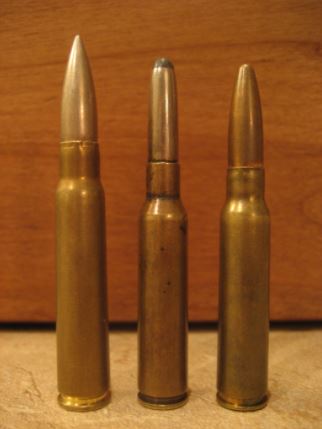7.35x51mm Carcano
The 7.35×51mm Carcano is a rifle cartridge that was the main small arms ammunition used by the Italian military during World War II.
It was designed during the 1930s to replace the 6.5×52mm Carcano used by the Italian military at the time. Unlike the previous 6.5mm cartridge, the 7.35mm cartridge featured a Spitzer-style bullet to minimize air resistance in flight.
Development
After reports of inadequate performance of the 6.5×52mm Mannlicher–Carcano at both short and long ranges during the campaigns in Italian North Africa (1924-1934), and the Second Italo-Abyssinian War (1935/36), the Italian army introduced a new short rifle in 1938, the Modello 1938, together with a new cartridge in 7.35x51mm caliber.
In addition to the slightly larger caliber, Italian ordnance designers introduced a spitzer-type bullet for the new cartridge, with the tip filled with aluminum to produce an unstable (tumbling) projectile upon impact with soft tissue (a design likely copied from the .303 British Mk VII bullet).
Results
Although the intention was to create a more powerful and precise rifle cartridge, the decision to adopt a lighter bullet than in the 6.5mm Carcano, along with various design problems with the 91/38 rifle, did not allow the cartridge to achieve its intended success.
Specifications
- Parent case: 6.5x52mm Carcano
- Case type: Rimless bottleneck
- Bullet diameter: 7.57 mm (0.298 in)
- Neck diameter: 8.32 mm (0.328 in)
- Shoulder diameter: 10.85 mm (0.427 in)
- Base diameter: 11.40 mm (0.449 in)
- Rim diameter: 11.40 mm (0.449 in)
- Case length: 51.50 mm (2.028 in)
- Overall length: 73.50 mm (2.894 in)
- Case capacity: 3.26 cm3 (50.3 gr H2O)
- Maximum pressure: 350 MPa (51,000 psi)
Ballistic Performance
| Weight (gr) | Velocity (ft/s & m/s) | Energy (ft Lbs & Joules) |
|---|---|---|
| 128 gr | 2,480 ft/s (760 m/s) | 1,762 ft lbs (2,389 J) |
